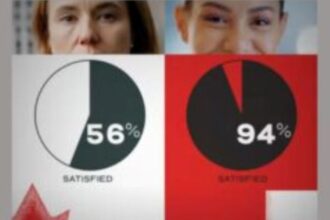In an extraordinary turn of events that has captured national attention, the New Brunswick government has issued a formal apology after hastily canceling a women’s-only topless spa event scheduled at a Saint John establishment. The controversy erupted when provincial officials intervened to shut down the planned gathering, only to reverse course following intense public backlash and scrutiny.
“We made an error in judgment,” acknowledged Premier Blaine Higgs in a statement released Thursday afternoon. “The government should not have interfered with a private event between consenting adults in a licensed establishment. For this overreach, we sincerely apologize.”
The event, organized by The Vault Spa & Salon in Saint John, was designed as a women’s-only gathering where attendees could enjoy spa amenities without tops in a private, controlled environment. Marketing materials emphasized body positivity and creating a safe space for women to experience freedom from conventional dress codes.
Problems began when the Department of Justice and Public Safety contacted the establishment just days before the scheduled event, warning that proceeding could potentially violate regulations governing public nudity. This intervention triggered immediate cancellation of the gathering and sparked outrage across social media platforms.
Legal experts quickly questioned the government’s legal standing in the matter. “There’s significant jurisprudence supporting toplessness in contexts where equivalent male behavior is permitted,” explained Emily Richardson, a constitutional rights attorney. “The Supreme Court has generally held that laws restricting female toplessness where male toplessness is allowed may constitute gender discrimination.”
The controversy intensified as documents obtained through information requests revealed internal government communications expressing concern about “community standards” and “family values,” language that critics characterized as outdated and paternalistic.
Feminist organizations across Canada rallied in support of the spa. “This represents the continued policing of women’s bodies,” said Karen Mitchell, director of Women’s Equality Now. “When we see men regularly enjoying pools and beaches without shirts, but women face government intervention for the same behavior, we’re looking at textbook discrimination.”
Following three days of mounting pressure from legal advocates, women’s rights organizations, and an increasingly vocal public, Justice Minister Ted Flemming announced the reversal. “After careful legal review, we have determined that our department overstepped its authority in this matter,” Flemming stated. “Private establishments have discretion to set dress codes for private events as long as they comply with safety regulations and human rights legislation.”
The Vault Spa has since rescheduled the event for next month, with owner Jessie Thompson expressing both frustration and vindication. “We’re pleased the government recognized its error, but this unnecessary interference cost us financially and created stress for our clients,” Thompson told CO24. “We hope this situation creates clearer guidelines moving forward.”
The incident has ignited broader political discussions about bodily autonomy and equal treatment under the law. Several municipalities across New Brunswick have announced plans to review their public decency ordinances to ensure gender-neutral application.
The controversy reflects ongoing tensions in many jurisdictions between traditional views on public decency and evolving societal standards regarding gender equality and bodily autonomy. Similar conflicts have emerged in Quebec, Ontario, and British Columbia in recent years, typically resulting in legal rulings supporting women’s right to equal topless access where men enjoy the same privilege.
As New Brunswick navigates the aftermath of this controversy, citizens and policymakers alike are confronting a fundamental question: Can we claim to have achieved gender equality when the same behavior permitted for men remains regulated, restricted, or stigmatized for women?
























